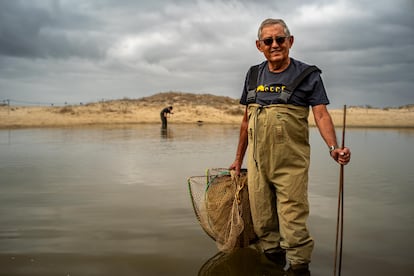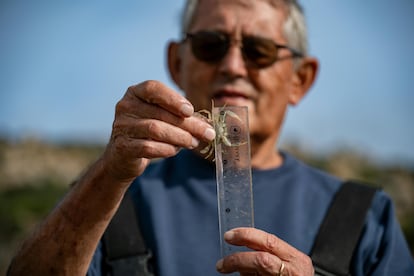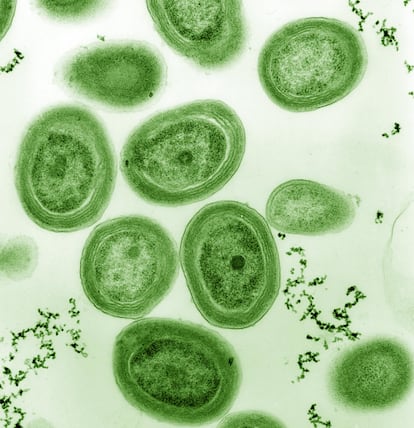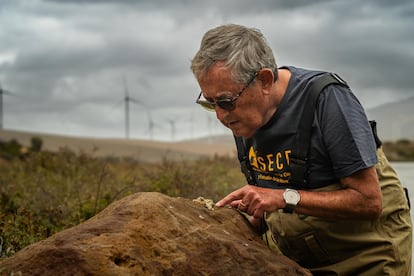Miguel Delibes de Castro, biologist: ‘Until recently, we were unaware of the existence of the most abundant living organism on the planet’
The scientist has published, 15 years later than planned, the book he hoped would convince his father — a writer and hunter — that the extinction of species represents a form of suicide for humanity

Before giving an important speech, the writer and hunter Miguel Delibes used to tell his eldest son: “Keep a copy ready in your jacket and, when I faint, you go up and continue where I left off.” On May 25, 1975, the father stood up in the imposing auditorium of the Royal Spanish Academy to formally accept his seat. What happened next was unexpected. Instead of a dissertation on literature, Delibes gave a biting speech on ecology, in which he attacked “the fickle greed of a minority of big capitalists” and “the brutal aggression against nature.” Sitting in the audience, ready to speak, was his eldest son: biologist Miguel Delibes de Castro. “He never fainted,” he recalls today of his father, the author of The Holy Innocents and The Path.
A couple of decades ago, an 83-year-old Delibes, who was recovering from cancer, called his first-born son to timidly propose that they write a book together. It would take the form of a dialogue, warning about the extreme heat caused by climate change, the increase in hurricanes, and the spread of desertification. When his son, Delibes de Castro, former director of the Doñana Biological Station, introduced the topic of biodiversity loss, his father responded: “Look, son, I understand that you’re troubled by the extinction of the lynx and that you’re working hard to prevent it. I’m upset by it as well; but you can’t compare its severity to the other issues we’ve discussed. The disappearance of species is very sad, but not dramatic. I don’t think it affects us too much.”
The result of that conversation was The Wounded Earth, but Delibes de Castro set out to convince his father with another book, one that would serve as a tribute to the richness and diversity of life on Earth.
The writer passed away in 2010, but the biologist has fulfilled that goal. His latest work, Gracias a la vida (Thanks to Life), shares its title with Violeta Parra’s famous song. Delibes de Castro, 77, reflects on the paradox that Parra took her own life just months after composing Gracias a la vida. In a video conference from his home in Barbate in the Spanish province in Cádiz, where he is studying an invasive crab species, the biologist expresses his fear that humanity might follow a similar path, ultimately self-destructing despite the wonders of life.
Question. Your father was offered to be the first editor-in-chief of EL PAÍS, but he turned the role down.
Answer. I think they offered it to him in 1975, not long after my mother died. He was deeply depressed and very downcast, with two relatively young children, aged 13 and 15, who needed to be raised. And Ortega [José Ortega Spottorno, founder of EL PAÍS] encouraged him by saying that it could be a stimulus for him. My father was seriously thinking about it, although I later read an interview with him in which he said that he hardly thought about it. The truth is that he talked about it with us, with his children, because he was very down and thought that it could cheer him up. But then he came to the conclusion that, if he had already lost his wife, he would also have to lose his city, Valladolid [to move to Madrid] his places to go hunting on weekends, his house...
Q. And his soccer team.
A. My father was a big fan of Real Valladolid, but when he started hunting on the weekends he didn’t go to soccer matches during the winter. When I was seven or eight years old, he would write very brief reports of the matches for El Noticiero Universal or for the magazine Vida Deportiva. My maternal grandfather would take me to the soccer matches and I would take some notes so my father could write a 300-word report. I would say: “Badenes scored the second goal with a header.” And my father would write: “Badenes, in an acrobatic leap, headed the ball into the back of the net.” But he hadn’t seen the match.

Q. Do you think that if your father had agreed to lead EL PAÍS, instead of Juan Luis Cebrián, the history of Spain would have been different?
A. Probably Juan Luis Cebrián, or another young person, was better suited to lead EL PAÍS, because my father was 55 years old at that time. He was a man who had lived through the [Spanisch civil] war and the post-war period. He was much more conditioned by the past. And, above all, he was very depressed. He went many years without writing. What’s more, my father was not very much of a public man. Being the editor of EL PAÍS, with so many meetings and meals, would have been very stressful for him.
Q. Your book is titled Gracias a la vida, like the song by Violeta Parra, and you yourself begin by saying that the Chilean composer killed herself. It’s paradoxical.
A. She killed herself a year after releasing the song, it was very soon aftwards. I wanted to point out that, in Western society, we think we love nature a lot, but then we are losing it, which in practice is like suicide too. I wanted to remind readers that Violeta Parra killed herself. Let’s hope that humans are able to avoid that outcome, because the destruction of biodiversity means our suicide as a species.
Q. Your book is a tribute to life, but not to the beautiful side of it, rather to what’s “unappreciated”: worms, weeds, fungi, microbes.
A. Yes, it’s easy for people to appreciate butterflies or swallows. But I wanted to highlight that even the things we don’t find attractive or may even dislike are playing a crucial role in helping us.
Q. You write that Charles Darwin’s last book, published six months before he died, was The Formation of Vegetable Mould Through the Action of Worms.
A. I’m fascinated by that. His first appearance in England before scholars after returning from his voyage [the trip around the world on the Beagle between 1831 and 1836] was to talk about the worms in his uncle’s house. And, 50 years later, his last book is still about worms, despite everything he had done along the way. It’s fascinating. Nowadays Darwin would never get a research project. There are jokes about this. In one caricature, Darwin is asked, “What do you want to study?” and he replies, “Well, how animals and plants change slowly over time.” Then they ask, “And how long do you think it will take?” to which he responds, “60 years.” The punchline: “Well, okay, the project is not granted.”
Q. In your book you speak of creatures worthy of a “horror film,” such as small parasitic wasps. You mention that Darwin wrote to a colleague in 1860 and said: “I cannot persuade myself that a beneficent and omnipotent God would have designedly created the Ichneumonidæ [parasitic wasps] with the express intention of their feeding within the living bodies of caterpillars.” Rather than adopting an atheistic pessimism, you find inspiration for a tribute to life.
A. If you believe — though I do not — that there is an infinite goodness that has organized life, then these concepts are very difficult to accept. Deep down, Darwin did not hold such beliefs, but he did not day to say so for fear of upsetting his wife. And I believe this is partly what made him delay the publication of his theories for a long time. These theories pointed to the fact that it was not God who governed life on Earth, and his wife was going to be very upset by this. In fact, that is what happened. And these things about the cruelty of parasitoids, who lay an egg inside a living animal and eat it from the inside without killing it so that it does not spoil, because it has to be eaten fresh, well, that seemed to him to be evil in its extreme.

Q. You write about the “most abundant organism in the world,” Prochlorococcus, a tiny green sphere in the ocean.
A. It is a very small bacterium. Until recently, no one knew that it existed. That was the fascinating thing. It is the most abundant living organism on the planet and we didn’t know it existed. And that was just over 30 years ago. Some say that there are probably other, even smaller and more abundant ones that we haven’t discovered yet.
Q. It is surprising that, even more than 30 years after its discovery, no one knows about this abundant bacteria.
A. It's very, very small. We didn't know about it because it was hard to detect. Biologist Penny Chisholm says that all the Prochlorococcus together weigh as much as 220 million Beetle cars [a model made by Volkswagen].
Q. You say in the book that foxes plant trees, creating landscape.
A. Animals that disperse seeds are called landscape engineers. They are the ones who design the edges of roads and rivers. Animals leave their droppings and first a thicket appears, then a bird lands there and leaves more droppings. And so all these wooded groves that run alongside rivers or border roads are created. We naturally see a new tree growing and it doesn't occur to us to think who planted it. Large seeds are usually dispersed by animals.

Q. You also write that there is a living being that measures a thousand hectares, under our feet.
A. Yes, I think it’s the published world record. It’s 965 hectares, about 1,500 football fields. And it’s just one fungus in Oregon, in the United States. They estimate it’s between 2,400 and 9,000 years old, so it’s been here a long time. It’s very striking that fungi can be microscopic — and we have them on our feet or face — and others can have 1,000 hectares of surface area. It’s impressive.
Q. Your father wrote The Rats in response to censorship in the press. He was unable to denounce the devastation in the fields of Castile and León caused by drought and torrential rains in his newspaper, so he chose to convey his message through a novel.
A. Above all, he wanted to denounce poverty due to social inequality, the neglect to which politicians had subjected these towns. They did this in El Norte de Castilla, in Valladolid, but they were drew attention. Manuel Fraga, who was the minister at the time, once threatened to close the newspaper. He told my father: “You’re screwing up my experiment with freedom of the press.” And my father said: “Well, if it’s an experiment, we’ll have to try it out and see what we can say.” They ended up appointing a deputy director of the newspaper with the ability to censor the director, and since my father was already a somewhat well-known writer, they told the deputy director: “If Delibes steps out of line, we’ll fire you, we’ll take away your press card.” This man told my father, because they were friends. And my father resigned immediately. He couldn’t risk someone else’s career. He resigned and decided to tell the story of the neglect of the Castilian countryside in a novel. And that led to The Rats.
Q. Do you think your book Gracias a la vida would have convinced your father?
A. I doubt it very much, I don’t think so. He would have said: “Hey, it is important, but many species have to disappear simultaneously for us to notice it.” It is hard to understand that there are 8 billion people in the world and, if each one destroys one worm per week, that is already many millions of worms. And this applies to birds, to the insects that we kill with our cars on the road... Experts studying the limits of deterioration that the Earth’s systems can endure suggest that, in terms of biodiversity loss, we are closer to the tipping point than we are with climate change. My father would have said, “Your arguments are not trivial; they are not wrong. However, I still do not believe it.”
Sign up for our weekly newsletter to get more English-language news coverage from EL PAÍS USA Edition
Tu suscripción se está usando en otro dispositivo
¿Quieres añadir otro usuario a tu suscripción?
Si continúas leyendo en este dispositivo, no se podrá leer en el otro.
FlechaTu suscripción se está usando en otro dispositivo y solo puedes acceder a EL PAÍS desde un dispositivo a la vez.
Si quieres compartir tu cuenta, cambia tu suscripción a la modalidad Premium, así podrás añadir otro usuario. Cada uno accederá con su propia cuenta de email, lo que os permitirá personalizar vuestra experiencia en EL PAÍS.
¿Tienes una suscripción de empresa? Accede aquí para contratar más cuentas.
En el caso de no saber quién está usando tu cuenta, te recomendamos cambiar tu contraseña aquí.
Si decides continuar compartiendo tu cuenta, este mensaje se mostrará en tu dispositivo y en el de la otra persona que está usando tu cuenta de forma indefinida, afectando a tu experiencia de lectura. Puedes consultar aquí los términos y condiciones de la suscripción digital.









































